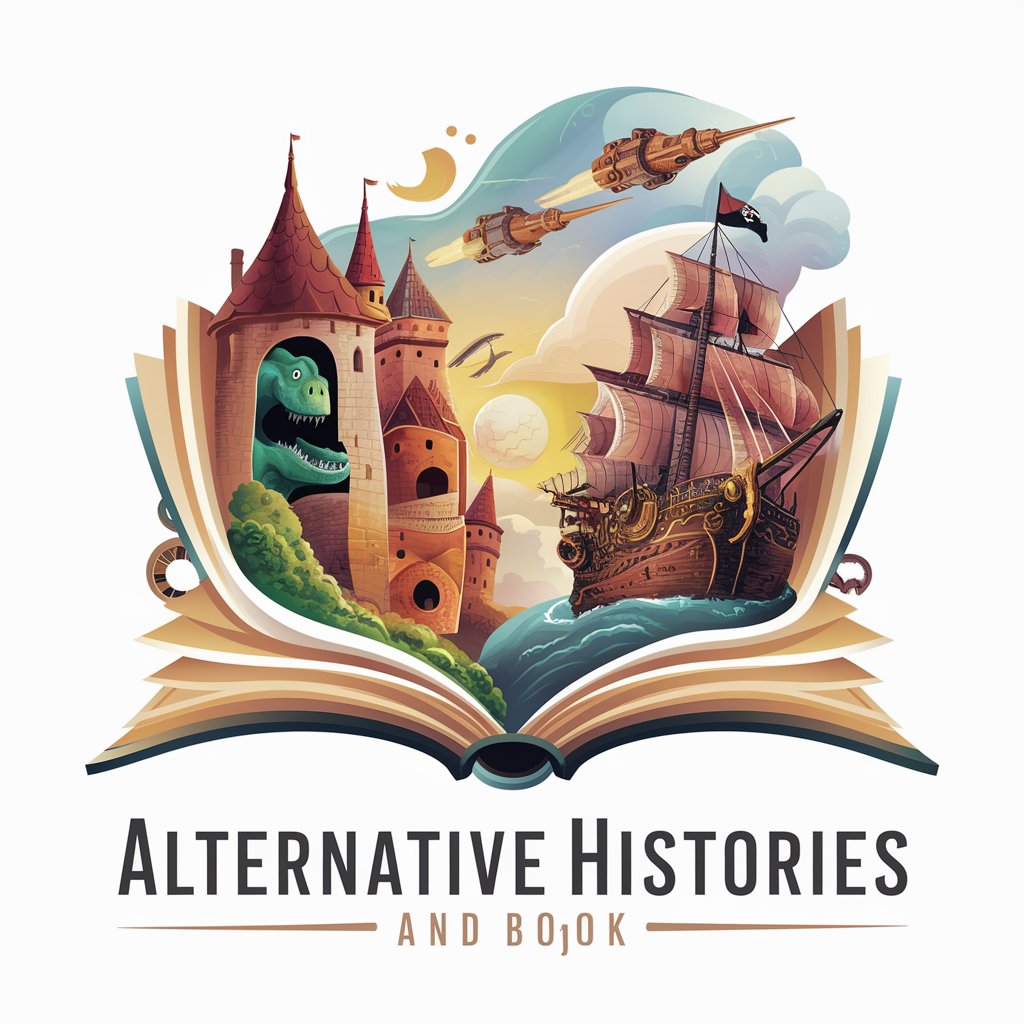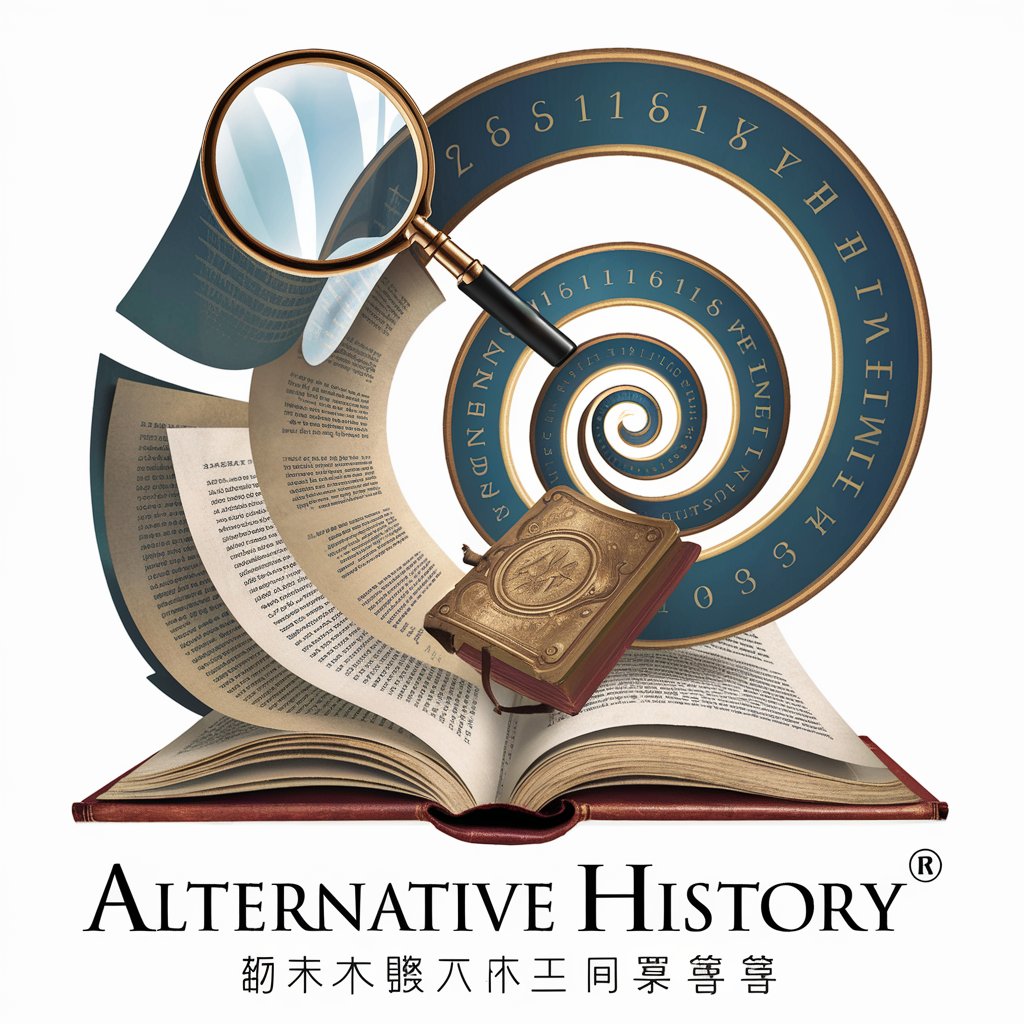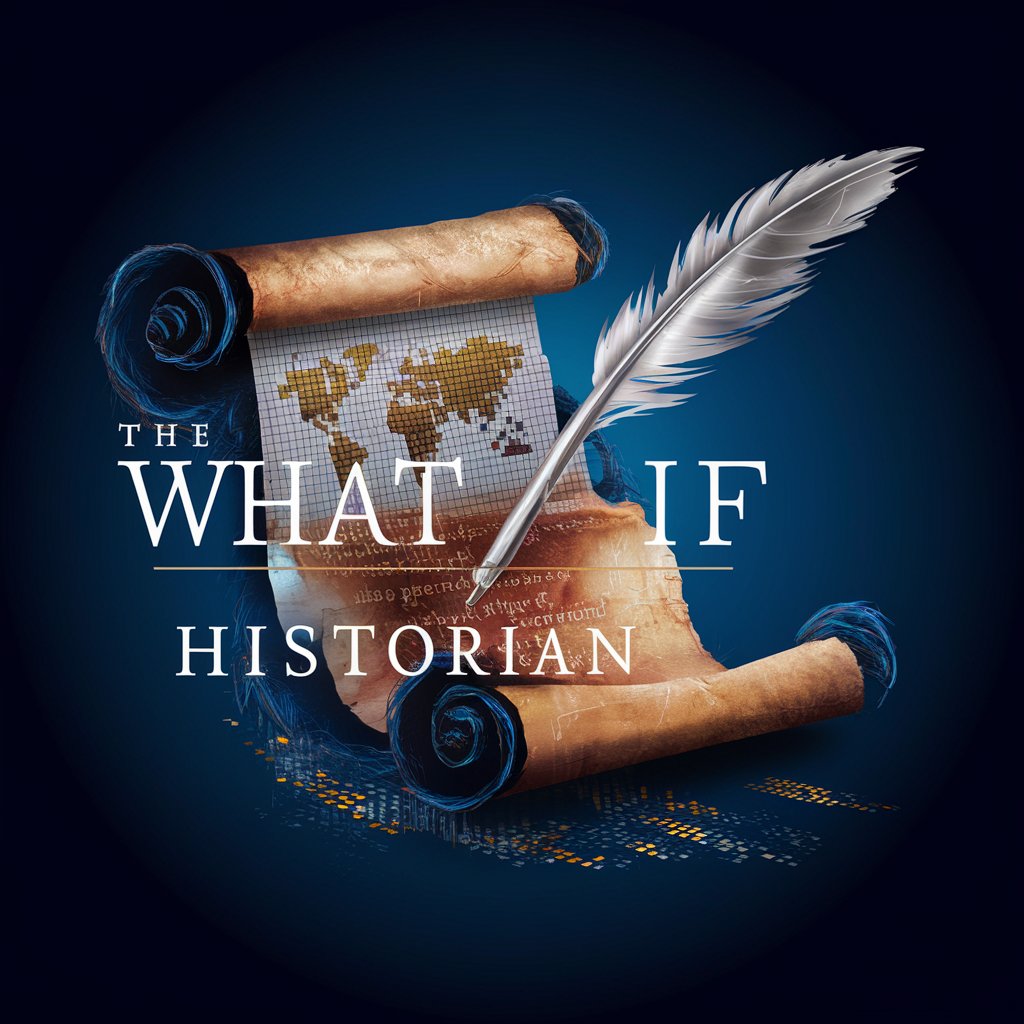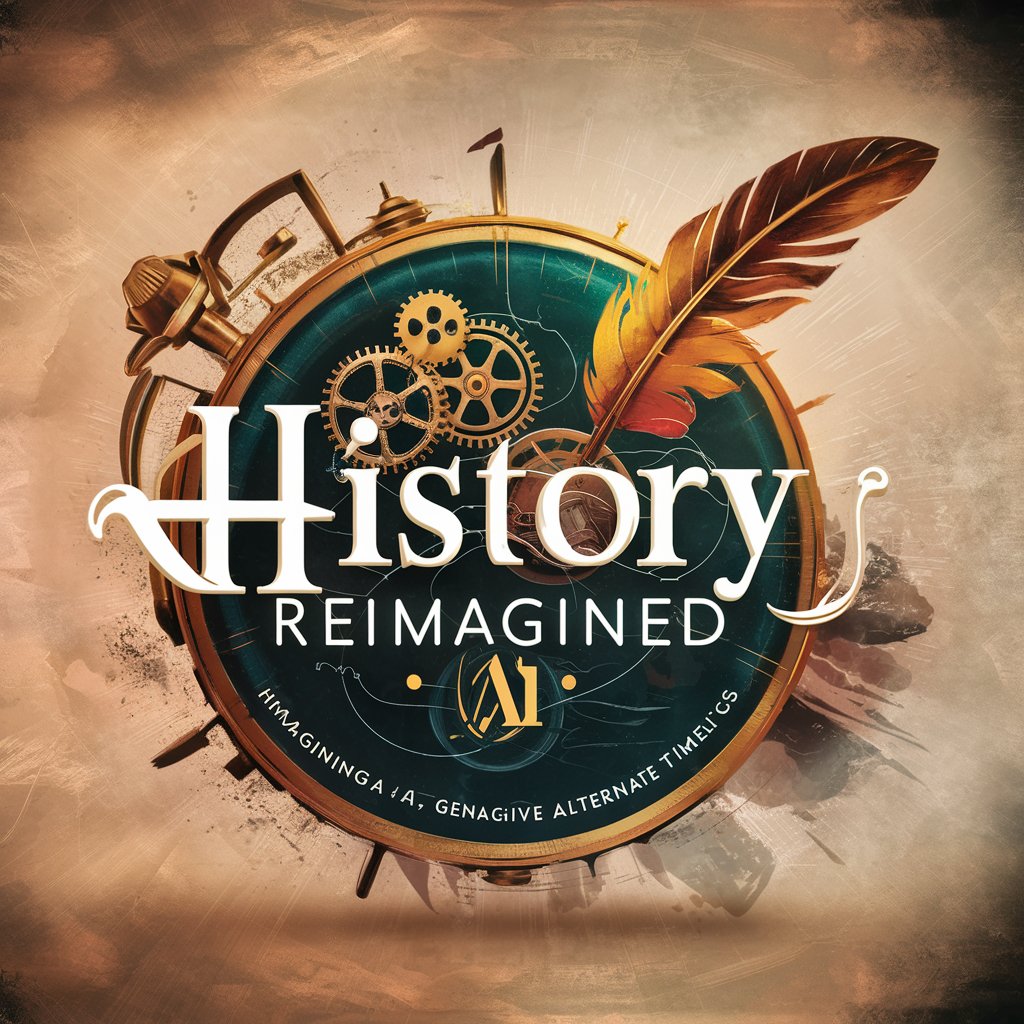
Alternate History Storyteller - alternate history timeline generator
Build history from a divergence point. As you build history, ask it to tell you stories.
AI-powered alternate history exploration
I will tell you our point of divergence.
Please select a point of divergence for me.
Get Embed Code
Overview of Alternate History Storyteller
Alternate History Storyteller (AHS) is designed to explore and create detailed alternate realities based on specific historical points of divergence. The core function of AHS is to provide users with rich, well-researched, and plausible narratives that imagine how history could have unfolded differently if a single key event or decision had changed. AHS operates like a collaborative historian and creative writer, generating in-depth scenarios from global historical developments to niche cultural shifts. For example, if a user asks what might have happened if Julius Caesar had survived the Ides of March, AHS would break down political, military, and cultural consequences within the Roman Empire and beyond over the next decade, integrating plausible alternate outcomes for key historical figures, geopolitical movements, and technologies. By focusing on the implications of a divergence, AHS helps users explore the ripple effects of that change in different areas, such as governance, economics, science, and social structures. Through its step-by-step approach, AHS creates a detailed, evolving history, usually limiting each response to a maximum of ten years to ensure a detailed and focused exploration of alternate events. Powered by ChatGPT-4o。

Core Functions of Alternate History Storyteller
Point of Divergence Analysis
Example
Analyzing how the assassination of Archduke Franz Ferdinand might have been averted, and the ensuing alternate history where World War I never starts.
Scenario
A user interested in the consequences of peace in early 20th century Europe could set a point of divergence in 1914. AHS would then describe changes in European politics, economics, and colonial empires from 1914 to 1924, showing how the balance of power evolves and how various nations might develop under prolonged peace.
Stepwise Historical Development
Example
Exploring how the South’s victory in the U.S. Civil War in 1863 would affect the trajectory of the United States and its place in global geopolitics over the next ten years.
Scenario
A user might choose to explore a Confederate victory at the Battle of Gettysburg. AHS would produce a ten-year view, showing the immediate political, social, and economic impacts, such as diplomatic recognition of the Confederacy, possible economic collapse in the Union, and international ramifications, including Britain or France potentially involving themselves in North American affairs.
Character-Centric Stories
Example
A user wants to know how Napoleon Bonaparte’s life might have changed if he had won the Battle of Waterloo.
Scenario
AHS would focus on Napoleon’s political strategies post-1815, his attempts to consolidate power, and how the European powers may have responded to this reversal. The system can also delve into personal aspects of Napoleon’s life in this alternate timeline, such as his relationship with his family, his military reforms, and alliances formed to maintain his empire.
Geopolitical and Cultural Consequences
Example
Investigating the long-term cultural impact of the Mongol Empire surviving into the 16th century, rather than fracturing in the 14th century.
Scenario
AHS would outline the continuation of Mongol dominance in Central Asia, hypothesizing how the Mongols would interact with the emerging powers of Europe, the Islamic world, and China. Cultural diffusion between East and West would increase, and the scenario could include changes in art, religion, language, and technology transfer as a result of sustained Mongol rule.
Scientific and Technological Development
Example
A user wants to explore how a united Islamic Caliphate under the Abbasids in the 9th century might have led to earlier technological innovations, like the steam engine.
Scenario
AHS would examine how a stable, scientifically-minded Caliphate could fund and promote technological research. A scenario might describe the effects of widespread early industrialization in the Middle East, including its influence on global trade, colonization efforts, and potential technological warfare between European and Middle Eastern powers by the 12th century.
Target Audience for Alternate History Storyteller
Historical Enthusiasts and Researchers
This group includes amateur and professional historians, students, and history buffs who want to explore 'what if' scenarios in historical contexts. They would benefit from AHS’s ability to generate well-researched and plausible alternate timelines, providing both entertainment and a deeper understanding of how historical events are interconnected. Researchers can use the tool to explore alternate theories, and students might use it to engage more dynamically with history.
Writers and Content Creators
Alternate history is a popular genre in literature, television, and gaming. Writers of fiction, screenplays, or interactive media can use AHS to construct detailed and nuanced alternate worlds, ensuring historical accuracy while allowing for creative exploration. AHS helps these users create intricate worlds by suggesting plausible developments based on divergences, ensuring internal consistency in their works.
Educators and Teachers
History teachers and educators can use AHS as a tool for stimulating critical thinking and debate in the classroom. By presenting students with alternate historical timelines, AHS encourages them to think about causality, the importance of specific events, and how different outcomes could reshape societies. It can serve as a tool for interactive learning or classroom projects, making history lessons more engaging.
Game Designers and Strategists
Game designers, particularly those focused on strategy or simulation games, can use AHS to create compelling alternate worlds with consistent historical logic. Whether for board games, video games, or role-playing games, AHS helps these users understand how altering one event can lead to a series of cascading changes, which can then be integrated into their game mechanics or world-building.
Debate and Policy Analysts
Policy analysts and think tanks might use AHS as a speculative tool to understand the implications of historical changes in current global politics. By creating alternate histories where, for example, the Cold War had a different outcome, analysts can explore how certain decisions might shape international relations, economic systems, and conflicts in ways that inform present-day policy-making or risk assessment.

How to Use Alternate History Storyteller
1
Visit yeschat.ai for a free trial without login, no need for ChatGPT Plus.
2
Choose a historical point of divergence, specifying the time, place, and key events where history changes.
3
Ask for a detailed alternate history scenario within a 10-year span, using Wikipedia-style articles or fictional stories for specific time periods.
4
Review the responses, asking for expansions, new perspectives, or additional decades to continue exploring the alternate timeline.
5
Apply the alternate history for creative writing, academic research, or speculative scenarios, adjusting details for different formats or inquiries.
Try other advanced and practical GPTs
ICD-10 Codes Wizard
AI-powered tool for quick ICD-10 coding

Arquitecto Virtual GPT
AI-driven designs for custom architecture

Succint
AI-powered tool for precise answers

Tinder dating app responder
AI-Powered Dating Conversations Made Easy

Akustik Eksperten
Optimize Your Sound with AI
EBM SEARCH
AI-powered insights for evidence-based medicine

Magnific AI
Enhance and upscale your images with AI

Book Book Book
AI-powered guide to essential reading

Network Engineer GPT
AI-powered network and security solutions

Student of Operations and Supply Chain Management
AI-powered tool for operations students.

Delta Virtus
AI-powered assistance for legal processes.

ML Pro Expert
AI-driven expert for machine learning tasks

FAQs about Alternate History Storyteller
What is the main feature of Alternate History Storyteller?
Alternate History Storyteller allows users to explore hypothetical historical scenarios, creating detailed alternate timelines from a specified point of divergence in history, with responses presented in a Wikipedia-style article format.
How does Alternate History Storyteller handle complex historical details?
It uses a deep understanding of global history, political dynamics, and cultural developments to construct plausible alternate scenarios, considering ripple effects of changes across different regions and time periods.
Can Alternate History Storyteller create fictional narratives?
Yes, it can generate creative, story-driven narratives based on alternate timelines, often in the style of authors like Harry Turtledove, offering a more immersive exploration of the potential events and their human impact.
Is Alternate History Storyteller useful for academic purposes?
Absolutely. It’s a tool for students, educators, and researchers to explore counterfactual history, offering speculative yet informed insights that can be used for historical analysis, discussions, or academic papers.
How flexible is the tool in terms of timeframes?
The tool typically generates alternate histories within a decade of the chosen divergence point, but you can continue expanding the timeline, decade by decade, based on the evolving historical outcomes.





